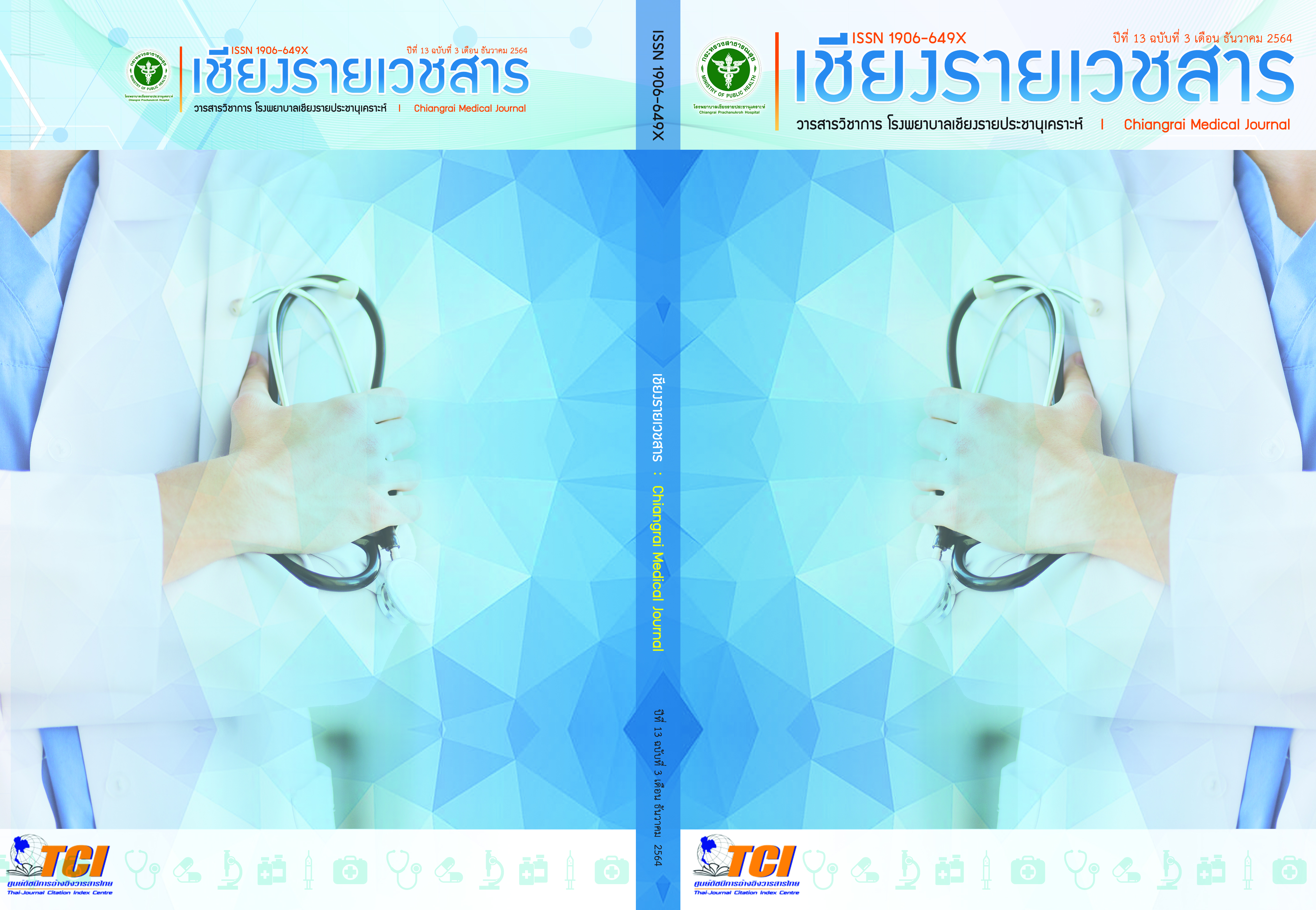ประสิทธิผลของโปรแกรมการปรับเปลี่ยนพฤติกรรมการบริโภคอาหารและกิจกรรมทางกาย โดยใช้ทฤษฎีพฤติกรรมตามแผนเป็นฐาน ในนักเรียนชั้นมัธยมศึกษาตอนต้น
Main Article Content
บทคัดย่อ
ความเป็นมา: เด็กวัยเรียนที่มีภาวะโภชนาการเกินเป็นหนึ่งในความท้าทายทางด้านสุขภาพในการจัดการปัญหา ทั้งในระดับประเทศและระดับโลก หากไม่ได้หาวิธีการที่เหมาะสมในการแก้ไขปัญหา ก็จะเกิดผลกระทบต่อปัญหาสุขภาพของเด็กวัยเรียน
วัตถุประสงค์: เพื่อศึกษาประสิทธิผลของโปรแกรมการปรับเปลี่ยนพฤติกรรมการบริโภคอาหารและกิจกรรมทางกาย โดยใช้ทฤษฎีพฤติกรรมตามแผนเป็นฐาน ในนักเรียนชั้นมัธยมศึกษาตอนต้น อำเภอเชียงของ จังหวัดเชียงราย
วิธีการศึกษา: เป็นการศึกษาแบบกึ่งทดลอง แบ่งเป็นกลุ่มทดลองและควบคุม วัดผลก่อนและหลังการทดลอง กลุ่มตัวอย่างเป็นนักเรียนชั้นมัธยมศึกษาตอนต้นที่มีภาวะโภชนาการเกิน ที่ศึกษาอยู่ในโรงเรียนเขตอำเภอเชียงของ จังหวัดเชียงราย ปีการศึกษา 2562 การคัดเลือกกลุ่มตัวอย่างตามเกณฑ์คัดเลือกคุณสมบัติของกลุ่มตัวอย่าง และสุ่มคัดเลือกกลุ่มตัวอย่างแบบหลายขั้นตอน แบ่งเป็นกลุ่มทดลอง 40 คน และกลุ่มควบคุม 40 คน โดยกลุ่มทดลองเป็นกลุ่มที่เข้ารับโปรแกรมการปรับเปลี่ยนพฤติกรรมเป็นระยะเวลา 12 สัปดาห์ และกลุ่มควบคุมเป็นกลุ่มที่ไม่ได้เข้ารับโปรแกรม เครื่องมือที่ใช้ ประกอบด้วยแบบสอบถาม และโปรแกรมการปรับเปลี่ยนพฤติกรรมการบริโภคอาหารและกิจกรรมทางกาย วิเคราะห์ข้อมูลด้วยสถิติเชิงพรรณนา คือ ความถี่ ร้อยละ ค่าเฉลี่ย และส่วนเบี่ยงเบนมาตรฐาน และค่าสถิติเชิงอนุมาน โดยใช้สถิติ paired t-test และ independent t-test
ผลการศึกษา: ภายหลังเข้ารับโปรแกรมการปรับเปลี่ยนพฤติกรรมการบริโภคอาหารและกิจกรรมทางกาย กลุ่มทดลองมีคะแนนเฉลี่ยพฤติกรรมการบริโภคอาหารและกิจกรรมทางกาย เจตคติต่อพฤติกรรม การคล้อยตามกลุ่มอ้างอิง การรับรู้ความสามารถในการควบคุมพฤติกรรม และความตั้งใจในพฤติกรรมการบริโภคอาหารและกิจกรรมทางกาย สูงกว่าก่อนเข้ารับโปรแกรม และกลุ่มควบคุม อย่างมีนัยสำคัญทางสถิติ (p < 0.05) กลุ่มทดลองมีคะแนนเฉลี่ยด้านพฤติกรรมการบริโภคอาหารและการออกกำลังกาย ทัศนคติต่อพฤติกรรม ความสอดคล้องของกลุ่มอ้างอิง การควบคุมพฤติกรรมทางปัญญา และความตั้งใจในพฤติกรรมการบริโภคอาหารและการออกกำลังกายมากกว่ากลุ่มควบคุมที่มีนัยสำคัญทางสถิติโดยมีค่า p 0.05
สรุปและข้อเสนอแนะ: โปรแกรมการปรับเปลี่ยนพฤติกรรมการบริโภคอาหารและกิจกรรมทางกาย สามารถทำให้นักเรียนชั้นมัธยมศึกษาตอนต้น มีพฤติกรรมการบริโภคอาหารและกิจกรรมทางกายที่ถูกต้องเหมาะสมเพิ่มขึ้นได้ ดังนั้น หน่วยงานทางด้านสุขภาพและสถาบันการศึกษา สามารถนำโปรแกรมการปรับเปลี่ยนพฤติกรรมการบริโภคอาหารและกิจกรรมทางกาย ไปใช้เพื่อส่งเสริมให้นักเรียนที่มีภาวะโภชนาการเกิน มีพฤติกรรมที่เหมาะสมต่อไป
Article Details
เอกสารอ้างอิง
Obesity and overweight [Internet]. Geneva: World Health Organization; 2021 [updated June 9; cited 2021 Dec 11]. Available from: https://www.who.int/news-room/fact-sheets/detail/obesity-and-overweight.
Bickerstaff B. Obesity in Thailand: Behold the perfect storm [Internet]. 2013 [updated July 14; cited 2019 May 20]. Available from: http://www.aust-thai.com/obesity.htm.
Bureau of Nutrition, Department of Health, Ministry of Public Health. National Nutrition Health Action Plan for 2019 - 2023. Bangkok: Amarin Printing and Publishing; 2019.
Likitmaskul S. Obesity problem: effection and interventions for preventing obesity in Thai children. In: santiprabhob J, Sritara P, Tungtongjit R, Jongsuwat R, Jittinan S, Yamborisut U, editors. Obesity is a silent threat to Thai children. Nonthaburi: The Graphico System; 2010. p. 1-20. ( in Thai)
Sopontammarak A. Physical activity recommendations for different age groups [Internet]. Bangkok: ThaiHealth Promotion Foundation; 2014 [updated July 31; cited 2021 Dec 11]. Available from: https://www.thaihealth.or.th/Content/25238-%E0%B8%81%E0%B8%B2%E0%B8%A3%E0%B8%AD%E0%B8%AD%E0%B8%81%E0%B8%81%E0%B8%B3%E0%B8%A5%E0%B8%B1%E0%B8%87%E0%B8%81%E0%B8%B2%E0%B8%A2%E0%B9%83%E0%B8%99%E0%B8%A7%E0%B8%B1%E0%B8%A2%E0%B8%95%E0%B9%88%E0%B8%B2%E0%B8%87%E0%B9%86.html.
Chuachai K, Sasiwongsaroj K, Pornsiripongse S, Ardsmiti N. Consequences of obesity and health behavior of obese children, Bangkok metropolitan. Journal of the Department of Medical Services. 2009;34(5):391-9. (in Thai)
Sothern MS. Obesity prevention in children: physical activity and nutrition. Nutrition. 2004;20:(7-8):704-8. (in thai).
Ajzen I. The theory of planned behavior. Organizational Behavior and Human Decision Processes. 1991;50(2):179-211.
Pongam-Phai B, Songwathana P, Boonyasopun U. Factors predicting intention to attend HIV screening services among pregnant women’s spouses. Thai Journal of Nursing Council. 2009;24(4):70-82. (in Thai)
Petchsuk R. A causal model of alcohol consumption behavior amongst high school students receiving school health service [Dissertation]. Bangkok: Christian University; 2010. (in Thai)
Health Data Center 2018 [Internet]. Chiang Rai: Chiang Rai Provincial Public Health Office; 2018[cited2019 May 29]. Available from: http://cri.hdc.moph.go.th.
Jena PK, Jeena BP. Overnutrition among schoolchildren in India: a review and meta-analysis. The Lancet Global Health. 2018;6(5):25.
OpenEpi: Open source epidemiologic statistics for Public Health [Internet]. 2013 [cited 2021 Nov 26]. Available from: https://www.openepi.com/Menu/OE_Menu.htm
Siljaru T. Research and SPSS AND AMOS statistical analysis. 13th ed. Bangkok: Business R&D; 2012. (in thai)
Neuman WL. Social Research Methods: qualitative and quantitative approaches. Boston: Allyn and Bacon; 2002.
Phetroch L, Chamniprasart A. Research methodology. Bangkok: Pimdee Printing; 2002.
Panmanee P. Effect of program promoting weight control behavior using Theory of Planned Behavior on weight control behavior in overweight school age children. Vajira Nursing Journal.2017;19(2):13-23.
Tuntiakara S, Thongbai W, Takviriyanun N. The effectiveness of obesity prevention program on eating and physicialactivity behaviors among overweight school-aged children. Journal of Boromarajonani College of Nursing.2015;31(3):47-61.
Penpong MS. Food Consumption Behavior of Students in Suratthani Province. Journal of Management Sciences. 2016;3(1):109-26.
Dechjob N, Bootchuntanasit K, Soonthisakol N, Nititam A. Effectiveness of Applying Theory of Planned to Promote Dietary Behavior for Weight Control of Overweight College Students. Journal of Health, Physical Education and Recreation. 2019;45(1).
Chumkiew A, Thongbunnak K. Chuensumran U, Tantranont N. Effectiveness of a weight control program focused on changing eating behavior in overweight obese students. Nursing Journal. 2019;46(3):106-1


